Dark Academia
When the pandemic exiled me from my library and my bookstore, it sent me to TikTok, and, more precisely, to dark academia. I spent lockdown days scrolling hungrily through its rich colors — chestnut, ochre, forest green — and the thick textures of well-loved cable-knit sweaters, weathered stone, and aged paper. I scrolled through videos with inspo photos of typewriters and stacks of books set up in front of frosted windowpanes, vlogs of trips to libraries and art museums, and fashion videos recommending dark academia wardrobe essentials and styling the aesthetic. One video bled into the next, each featuring a pale, skeletally thin, bookish youth with straight hair and light-colored eyes, navigating a world suffused by a vintage, preppy, gender-neutral style. The world dark academia presented seemed so habitable to me as an avid reader, former emo Tumblr poet, and now a PhD student. It promised to gratify my abiding love for the smell of old books, the soft feeling of worn-in leather, and the crisp crunching of leaves under my platform Doc Martens. But something was missing from the content I devoured, and I had a nagging feeling that maybe it was me. As a Black queer woman, I am as excluded from dark academia as I am from every other contemporary online aesthetic that idealizes whiteness. And that left me wondering: why does dark academia have to be personified always in these white, waifish types, who serve perennially as its muses and objects of desire?
In other words, as dark academia Redditor quartzdelta has asked, is it possible to be too dark for dark academia?1 And the bigger, too often overlooked side of the same question: how do Black women find pleasure through engagement with these hostile digital spaces? Despite the overwhelming whiteness of dark academia writ large, Black creators use digital platforms to extend the imaginaries and possibilities of dark academic texts and aesthetics. Furthermore, digital sites can serve as spaces for Black women interested in academia and academic life to build and find community while also reframing their relationship to academic spaces that are often elitist, inaccessible, and hostile to women of color. I know that other Black women are drawn to dark academia, yet it can be difficult to navigate the aesthetic and its community when you rarely see yourself represented. Dark academia has allowed me to reconnect with my love of learning and my passion for art and literature; it has also allowed me to find a community of other marginalized folks (although this took quite a bit of searching) who feel the same. Dark academia has also allowed me to recenter my experiences within larger creative and historical narratives in which people like me are often erased or ignored.
In particular, TikTok offers valuable insight into how Black women negotiate their identities and pleasure online. As the only non-Facebook app to achieve three billion downloads, TikTok is a key site where cultural meaning and capital are generated, Black creators on the app continuously speak out against shadowbanning and content suppression, racist content and harassment, and cultural appropriation.2 Black culture is an undercurrent that keeps the platform afloat, as proven by the lack of content produced when Black creators went on strike last summer, refusing to create new dances to Megan Thee Stallion's song "Thot Shit." White content creators capitalize on the creative work of Black TikTokers, such as when Charli D'Amelio performed the viral dance "the Renegade" on late-night talk shows and basketball half-time shows without crediting Black choreographer Jalaiah Harmon. White TikTokers are propelled to fame by recreating or remixing content from Black creators, who are rarely credited.
So why do Black women continue to create content online? From bell hooks's conceptualization of the "oppositional gaze" (a critical and resistant form of looking at media that grants Black women agency) to more recent discussions about Black women's audiencehood, Black feminist thought and Black cyberfeminist theory offer an explanation: even in the face of the ambient racism of the platform, Black women's media engagement is often an agentic, resistant, and communal act. Despite the barriers imposed by hostile online environments like shadowbanning, algorithmic bias, and harassment from other users, Black women use social media to engage in creative work and build community. Beyond resistance, Black women also find pleasure and joy in digital spaces, including in predominantly white digital spaces like dark academia.
Using personal blogs, YouTube videos, Black Twitter, and most recently TikTok, Black women have continuously carved out spaces for ourselves online, engaging in pleasurable community-building practices and renegotiating Black womanhood outside of mainstream media. Online spaces can offer a wider spectrum of possibilities for Black imaginaries than often presented in legacy media. Reframing pleasure as a "liberatory Black feminist project," I am fascinated by the potential for Black women's resistance and joy in digital spaces.3 For Black women, sharing joy through depictions of everyday life online is a radical and subversive act, a celebration of Black life that challenges mainstream media's fixation with Black death. Despite rampant racism and cultural appropriation on platforms like TikTok, Black women continue to create content, from choreographing new dances, vlogging their everyday lives, cooking family recipes, and sharing information about Black history, among many others, as ways to share their everyday experiences and build Black community. Joy is an assertion of Black people's humanity and dynamic emotionality, and digital spaces — such as the online communities built around dark academia — can offer Black women sites to reclaim their subjecthood and highlight Black joy and life.4
But while Black women's labor has always been essential to TikTok's popularity, our engagement with that platform gets discussed solely in terms of the social and financial gains that result from it — for creators, for TikTok, or for the world by some definition. I would like to think about it instead as an act and expression of pleasure. Exploring Black women's pleasure as a motivator for content creation repositions Black women as multifaceted agentic beings who desire, seek out, and achieve pleasure, expressing joy amidst often hostile social and digital environments. Black women can gain both pleasure and knowledge — the cornerstones of dark academia both as a digital aesthetic and as a narrative structure — through creating dark academic content online.
Dark academia has been criticized for its Eurocentrism, lack of diversity, and academic elitism. Tumblr user ca-tk-in states that dark academia "demonstrates the dangers of elitism," rendering the issues that occur within real universities (rising tuition costs, student loan debt, sexual violence, racism, exploitation of graduate students' labor, the decline of institutional support for the humanities, and lack of job security for lecturers, among other things).5 Others lament that dark academia romanticizes college life without "criticizing the institutions and other students who make it so difficult for marginalized students" struggling with mental health and racism.6 These critiques of dark academia also correspond with the offline material experiences of Black women in academic spaces. Black women in higher education face additional stressors, including higher rates of student loan debt, and discrimination furthered by oppressive institutions and the prevalence of racism in American culture. Sociocultural expectations and tropes like the "strong Black woman" also impact how Black women seek and receive care for both their mental and physical health.
As a Black queer woman who has studied at predominantly white institutions, I have gotten used to being the only woman of color in the room. I have seen white professors shuffle uncomfortably when discussing race, stumbling over Black women's names, relegating our contributions to the "diversity week" on the syllabus. I have shared tired glances of solidarity with other Black students while avoiding alt-right demonstrations in the campus square. I have had to sit in seminars with my white peers while they unpack their own internalized racism then look to me for approval, to which I pull out the metaphorical gold star sticker and place it on their foreheads in an act of absolution, because it is easier than saying anything for fear of being labeled "angry" or "difficult" or "the one who always talks about race."
In short, my experiences as a Black queer woman in academia are rarely represented. The institutional violence I have faced is far from the cozy, aesthetically pleasing realm of intellectual development that dark academia depicts. Dark academia may romanticize late nights in the library and caffeine addictions, but in reality, Black women are often reprimanded for simply existing in public spaces. For instance, Lolade Siyonbola, a Black graduate student at Yale, was napping in a common room when a white student reported her to the police.7 In academia and beyond, Black women are continuously affronted under the premise that they do not belong in spaces of higher education. These experiences were not detailed in my graduate student handbooks; there are no footnotes in the glossy admissions packets full of smiling Black and brown people that tell you that most of your experience in grad school will be educating others and dodging microaggressions, and that it will be indescribably exhausting. It is no wonder, then, that so many Black women seek out dark academia as a form of escape and expression, a place to engage with knowledge on their own terms and center their identities and experiences. Dark Academia can afford Black women pleasure and the opportunity to rewrite literary and historical narratives that have often ignored us. The pleasure we experience, like our identities and experiences, is also multifaceted, from the creative elements of digital content creation, to forging beloved communities, to opportunities for self-expression through fashion, art, and literature.
While criticisms of dark academia are certainly valid and address how iterations of the aesthetic can further marginalize Black women, unilaterally denouncing dark academia online for being "too white" ignores the Black women who do participate, and the pleasure they receive from doing so. After all, participating in aesthetics can be a valuable form of self-discovery and community building - from creating and curating content online to belonging to a community. Searching "dark academia Black girl" on TikTok brings up a diverse catalog of videos from plus-sized, tattooed, and non-binary Black dark academics. This beloved corner of dark academia TikTok celebrates diversity and invites inclusivity, but due to TikTok's mysterious and often hostile algorithm, to see these videos, I had to seek them out using specific search terms. Videos by Black dark academics also have significantly fewer views than dark academia content from white creators. The algorithm perpetuates systemic erasure, hiding Black creators from the feed, perpetuating the harmful assumption that Black people do not participate in the curation and creation of aesthetics online.
One of the most popular Black dark academics on TikTok is cosyfaerie, a Black Muslim creator with over 282.3k followers. She wears a hijab and combines dark academia, cottage-core, and other romantic styles with a modest sartorial perspective.
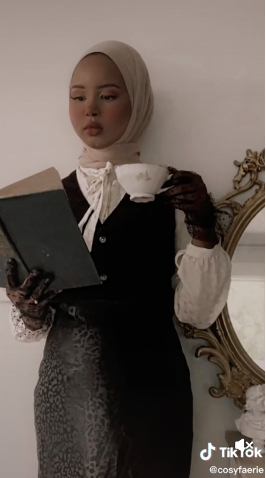
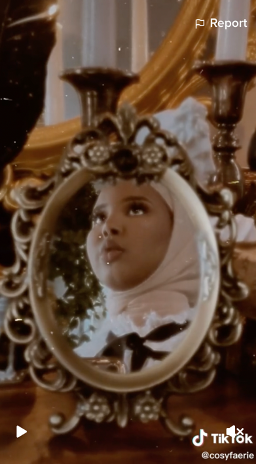
Most of her content is about styling dark academic fashion. Each video is set to soft classical music, with shots of gilded mirrors, warm cups of tea, and letters handwritten in cursive. cosyfaerie started her account in response to the lack of representation of Black dark academics. She has created a welcoming environment through her content, offering a glimpse into her cozy life "reading, writing, sipping coffee, and dreaming" that makes other BIPOC interested in dark academia feel seen.8
cosyfaerie's visibility and engagement with dark academia sets an example for other Black women, presenting dark academia as something they can enjoy and can customize to fit their lifestyles. In a world where Black women are often not given the chance to be soft or the space to dream, cosyfaerie provides desperately needed representation. Other Black dark academic videos offer moodboards and carousels of images of Black women with afros, natural hair, braids, straightened hair tied in bows and long weaves, wearing skirts and sweaters and long jackets and blazers and suit pants. Many Black creators showcase their hair as a way to put a personal touch on an otherwise Eurocentric aesthetic, offering tips and "inspo" for easy dark academic natural hairstyles and creative ways to adorn and celebrate their natural hair textures.
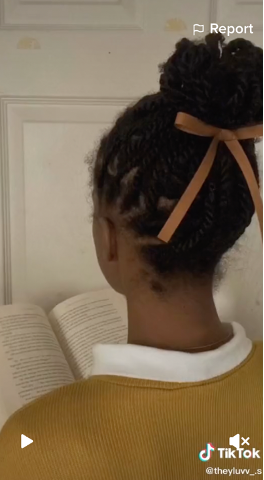
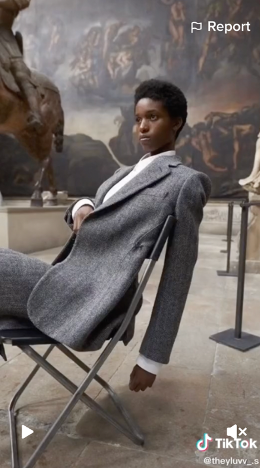
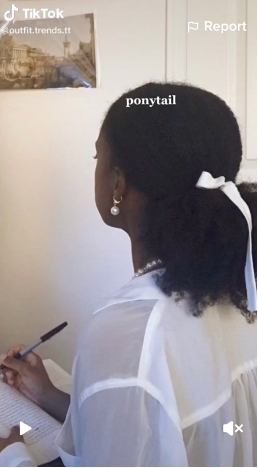
Like Alice down the rabbit hole, I tumbled through the algorithm. I began seeing other popular hashtags on Black dark academia content, illuminating spaces on TikTok where aesthetics, literature, and higher education converge. I came across a surprising number of videos made by Black women in graduate school, bridging the fantasy-world of dark academia and the real-world experiences of Black women in higher education. Synthesizing the dark academic aesthetic and the ordinary details of academic life, #Blackacademia features Black women sharing study tips and advice on navigating graduate school. Some creators even host "live" study sessions, inviting others to join and virtually study together. This representation and advice is especially valuable for Black women who are first-generation college students and may not have a supportive network on campus. Many dark academic videos focused on literature and dark academia as a genre, linking dark academia and #booktok, a literary corner of TikTok for those that are passionate about books and reading. Creators share short reviews and offer book suggestions based on themes or interests. My participation in dark academia, as well as in #booktok and #Blackacademia, challenges preconceived notions that Black women do not belong in spaces of higher education or are not interested in romance or fantasy.
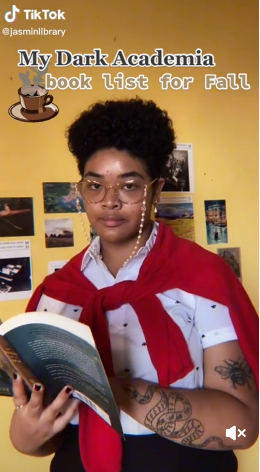
When Reddit user quartzdelta asks if she is "Too Dark for Dark Academia?" she explains that she adores dark academia but is seeking ways to incorporate her natural 4C (dense and tightly coiled) hair into the aesthetic.9 The post became a space of support for other Black dark academics who expressed uncertainty and curiosity about how their Blackness fits within an aesthetic that idealizes Eurocentric beauty standards. In another post, user TimelyWitness5638 comments on enjoying dark academia as a Black person, expressing that the aesthetics, fashion trends, and media have provided joy, offered space for liberation, and allowed them to forge friendships with others. Yet, they express guilt for enjoying dark academia, posing the question: "am I a bad person for enjoying this aesthetic?"10 Here, being a "bad person" alludes to participating in dark academia despite its classist elitism and racism. In response, the feed is flooded with overwhelming support from other BIPOC dark academics explaining what dark academia means to them. Many dark academics also expressed pleasure from participating in the aesthetic, taking pride in their interests and "cultivating a visually pleasing and safe environment for oneself."11 Dark academia promotes a fantasy through narratives of grandiose romantic gestures or images of simple moments of quiet solitude. Yet, even in these highly stylized fictions, Black women are often unable to find ourselves. The real concern lurking behind these Redditors' questions seems to be: "can dark academia be for me?"
For Black dark academics, the aesthetic's nostalgic appeal is also a desire to see oneself reflected in historic narratives and intellectual canons. Many Black TikTok users use the dark academia's aesthetics to interrogate how whiteness and Eurocentric knowledge production have been centered in academic spaces. Black women dark academics are introducing alternative forms of knowledge, centering Black women's lived experiences and creative work as valuable sites of knowledge produced outside of academic structures. By prioritizing Black women's identities, experiences, and pleasure, Black women who create dark academic content on social media engage in a form of Black feminist resistance. Black women's experiences in dark academia also echo afro-futuristic ideologies by allowing Black folks to engage with the past, projecting Black life and joy into historical narratives, while simultaneously reimagining possibilities for vivid Black futures. These online spaces are inclusive communities that actively fight against racism and elitism, making the pursuit of knowledge accessible to everyone.
And yet along with resistance, there is pleasure. Many Black women dark academics discuss the joy in "picking and choosing" which elements of the aesthetic to incorporate into their lifestyles; as expressed by Reddit user awarmlight: "I want gloomy days, books, and coffee. I don't want systemic racism. So I'm taking the bits I want and fuck the rest."12 Dark academia can afford Black women space to dream and reimagine, allowing Black women to place themselves as main characters within the aesthetics' narratives. As I sit in the carrels of my campus library, I imagine myself as a Black dark academic main character. She has warm brown skin, thick untamable hair that bounces between the stacks, and deep brown eyes. She wears thrifted oversized knits because she can't afford cashmere on a grad student stipend. She is soft and strong, beautiful and brilliant.
These moments of escape do not change the historical and systemic barriers preventing Black women from accessing higher education, or hostility many Black women face in the classroom. Nor do they offer a solution to the emotional labor that Black women engage in or the fatigue they experience. But they can offer reprieve: a warm cup of tea on a snowy winter day, a restorative space to dream. I want a dark academia that can acknowledge our complexities, that doesn't flatten Black women, straighten their hair, narrow their curves, relegate them to the margins, as sidekicks or minor characters existing on the edges of inked pages. I shouldn't want to have to read between the lines to find my experience. Black women deserve to rest, to dream, to be desired — to seek and have both pleasure and knowledge. For me, the pleasure lies in the possibilities, in curating dark academia into whatever I want it to be.
Mel Monier (@moniermel) is a PhD student and Rackham Merit Fellow in the Department of Communication and Media at the University of Michigan. Their research interests include intersectional feminist media studies, digital media studies, and representations of race, gender, and sexuality in the media.
References
- u/quartzdelta, "Too Dark for Dark Academia?" r/DarkAcademia, Reddit, February 25, 2020.[⤒]
- Apryl A. Williams, "On Thursdays We Watch Scandal: Communal Viewing and Black Twitter," in Digital Sociologies, edited by Jessie Daniels, Karen Gregory, and Tressie McMillan Cottom (University of Bristol: Policy Press, 2017), 273-294, 289; Rae Hodge, "TikTok Hits 3 Billion Downloads," CNET, July 14, 2021.[⤒]
- Joan Morgan, "Why We Get Off: Moving Towards a Black Feminist Politics of Pleasure," The Black Scholar 45, no. 4 (Winter 2015): 36-46, 39.[⤒]
- Jessica H. Lu and Catherine Knight Steele, "'Joy Is Resistance': Cross-Platform Resilience and (Re)Invention of Black Oral Culture Online," Information, Communication & Society 22, no. 6 (2019): 823-837, 829.[⤒]
- Caitlin (ca-tk-in), "I may be about to get needlessly controversial on main about dark academia" ca-tk-in (blog), April 9, 2019.[⤒]
- Beata Garrett, "'The Secret History' Makes Strides in Budding Dark Academia Genre," Mount Holyoke News, October 6, 2019.[⤒]
- Brandon Griggs, "A Black Yale Graduate Student Took a Nap in Her Dorm's Common Room. So a White Student Called Police," CNN, May 12, 2019.[⤒]
- cosyfaerie, TikTok. [⤒]
- u/quartzdelta, "Too Dark for Dark Academia?"[⤒]
- u/TimelyWitness5638, "How it feels to enjoy dark academia as a black person," r/DarkAcademia, Reddit, November 6, 2021.[⤒]
- u/muh_lett_brain, November 6, 2021 (7:40 p.m.), comment on u/TimelyWitness5638, "How it feels to enjoy dark academia as a black person."[⤒]
- u/awarmlight, November 6, 2021 (6:43 p.m.), comment on u/TimelyWitness5638, "How it feels to enjoy dark academia as a black person."[⤒]
